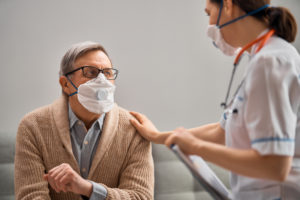CMS Announces Enhanced COVID-19 Compliance & Enforcement for Nursing Homes
 The COVID-19 global pandemic has changed our lives. The effect on the healthcare industry has been immeasurable, and nursing homes are among the hardest hit sectors. The elderly population is the most vulnerable to the novel coronavirus, and nursing facilities have had to confront both the emotional toll of the illness and the practical considerations attendant to controlling its spread. With the United States still stuck in a COVID-19 plateau, the nightmare is far from over.
The COVID-19 global pandemic has changed our lives. The effect on the healthcare industry has been immeasurable, and nursing homes are among the hardest hit sectors. The elderly population is the most vulnerable to the novel coronavirus, and nursing facilities have had to confront both the emotional toll of the illness and the practical considerations attendant to controlling its spread. With the United States still stuck in a COVID-19 plateau, the nightmare is far from over.
On June 1, 2020, the Centers for Medicare and Medicaid Services (CMS) announced additional COVID-19 survey activities, enhanced enforcement for Infection Control Deficiencies (ICDs), and new quality improvement activities for states and nursing homes.
- Survey Activities – In addition to Focused Infection Control (FIC) surveys of nursing homes, CMS is now requiring states to perform (1) on-site surveys of nursing facilities with previous COVID-19 outbreaks by July 1, 2020; (2) on-site surveys of facilities with certain qualifying new COVID-19 cases; and (3) FIC surveys of 20% of nursing homes starting in FY 2021. Of note, as of CMS’s announcement, 49.4% of Tennessee nursing homes had been surveyed since the pandemic began, just below the national average of 54.1%. States that fail to perform these inspections could lose up to 5% of their CARES Act funding. CMS also announced expanded survey activities for states in Phase 3 of its Nursing Homes Re-opening guidance.
- Enforcement – CMS’s announcement included enhanced enforcement measures for ICDs. Substantial non-compliance (D or above) may now lead to enhanced Directed Plans of Correction, denial of payment for new admissions, Civil Monetary Penalties (CMPs), and shorter deadlines to demonstrate compliance on a sliding scale based on prior ICD citations.
- Quality Improvement Organization (QIO) Support – In addition to the education and training QIOs already provide, particularly to underserved and rural areas, QIOs are now being deployed to provide technical assistance. This effort is focused on approximately 3,000 nursing homes with histories of infection control challenges. States may also request QIO assistance for nursing facilities that have experienced an outbreak.
The elderly population is the most vulnerable to the novel coronavirus, and nursing facilities have had to confront both the emotional toll of the illness and the practical considerations attendant to controlling its spread
COVID-19 continues to spread and authorities continue to assign blame. Nursing home providers with questions or concerns about these new measures, or who are subject to enforcement actions, should seek counsel with compliance and enforcement experience. Subscribe to the SRVH blog for further updates and contact the lawyers in our Government Compliance & Investigations or Healthcare groups with any questions or concerns.
Photo By Yuganov Konstantin from Shutterstock





